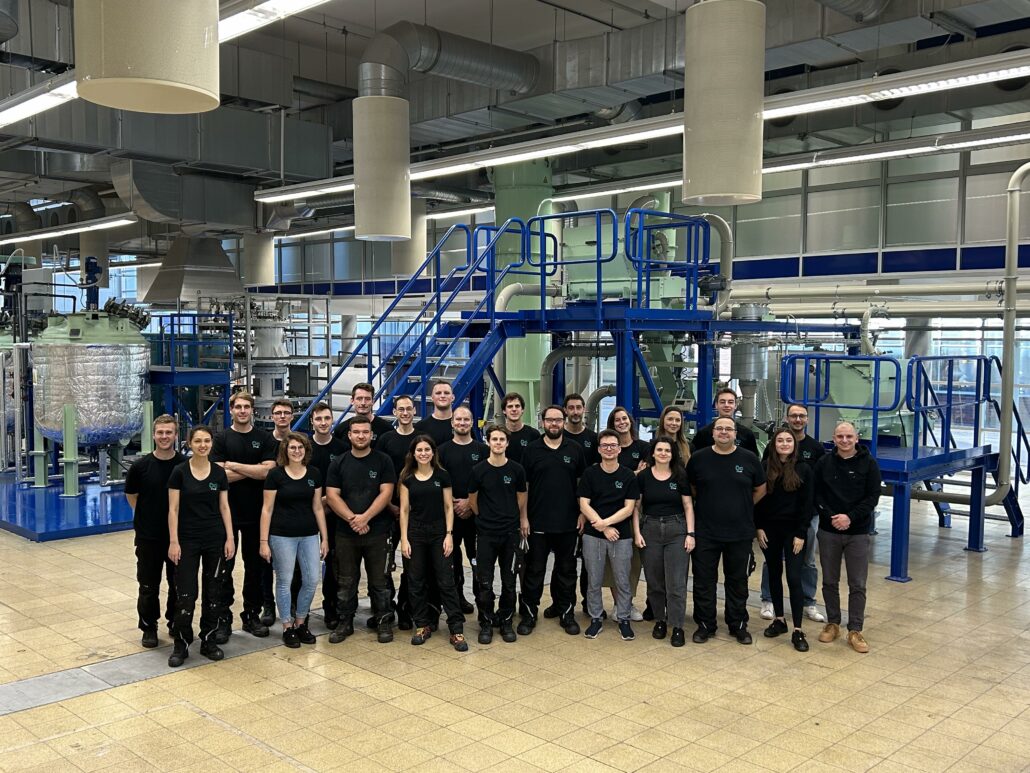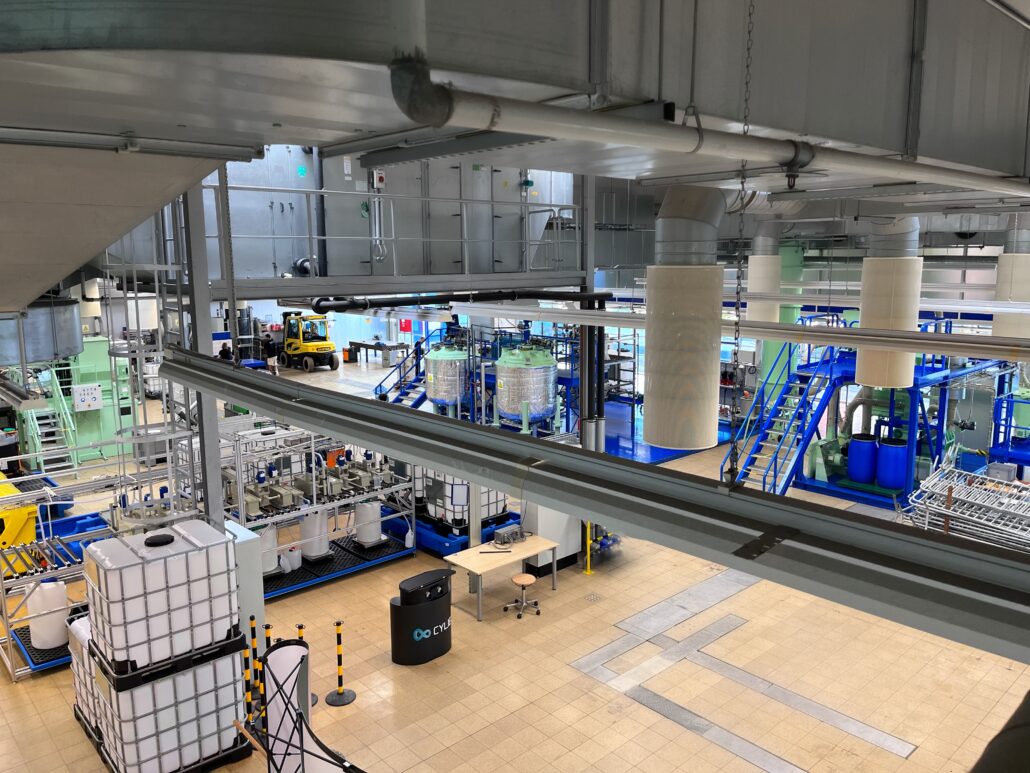A short time ago, the Germany-based “cylib” battery recycling company launched its pilot plant in Aachen. While the facility can already recycle 500 kilograms of used batteries per day, the start-up team led by founder Lilian Schwich is already working on a larger plant. Battery-News spoke with co-founders Gideon Schwich (COO) and Paul Sabarny (CTO) about the company, its specific plans, and its recycling technology.
Battery-News: You recently inaugurated your pilot plant in Aachen’s “Rothe Erde” district. How did you get involved with batteries in general and recycling in particular?
Paul Sabarny: The idea for “cylib” came about during our time at Metallurgical Process Engineering and Metal Recycling Institute of RWTH Aachen University. Lilian had already started researching battery recycling in 2016, when she was active in this field as a lone wolf, so to speak. At that time, first recycling methods were just emerging. The focus was still primarily on pyrometallurgy. This meant that batteries were simply melted down, and only a few elements were considered. Lilian and IEM’s Professor Friedrich had therefore identified enormous potential for improvement.
“We observed the market and the approaches to solutions and we asked ourselves: Why aren’t the recycling companies implementing this?”
Paul Sabarny, CTO of cylib GmbH
Battery-News: So that was the initial spark. But how did the company come to be founded?
Sabarny: Over several years, during which we were active in research, this idea developed further. We observed the market and the approaches to solutions. This eventually led us to ask ourselves: Why aren’t the recycling companies implementing this? Why aren’t they taking into account materials like lithium or graphite and instead focusing only on nickel and cobalt? Of course, this was for economic reasons, which is understandable, but that is neither sustainable nor does it meet our goal with regard to circular economy. Based on these considerations, we started to develop a process that finally resulted in the cylib technology.
Battery-News: You are planning to build a recycling plant in 2024. Can you tell us more about that?
Sabarny: We just inaugurated the pilot line, which has a much larger capacity than our previous institute. That’s not a full industrial scale yet, though. Construction is scheduled to begin in 2024, and the line will be launched in the next few years. The knowledge we gather in the pilot plant will be used in parallel in the planning of the industrial plant, which is already underway.
Gideon Schwich: We can already see that recycling capacity demand significantly exceeds the volume of our pilot line. Many automotive manufacturers have contacted us, and we have entered into collaborations with small local producers as well as with German OEMs.

Battery-News: Is your focus mainly on end-of-life cells or do you also recycle production scrap?
Schwich: Basically, we have designed our process to be extremely flexible and robust. That means we can process normal packs that are at the end of their life cycle as well as production scrap. The latter is extremely interesting because it already exists. With batteries, it’s like the first returning batteries are just starting to show up. The majority of end-of-life batteries will come back in the next seven to ten, maybe twelve years – depending on how the models are driven.
Sabarny: In principle, we can process everything from coated films to complete batteries. We are looking forward to including such material in our process. At the same time, we have the potential to process black mass from other recycling companies.
Schwich: We expect that what comes our way in the next months and years will be very diverse – be it production scrap, first end-of-life cells, prototype or damaged batteries. Of course, we have to sort the material that comes to us.
“One of our special features is the flexibility of our process, which is designed to have multiple input stages. We can take in different materials at different points in time.”
Gideon Schwich, COO of cylib GmbH
Battery-News: What specific goals are you currently pursuing, and what are the special features of your process?
Schwich: One of our special features is the flexibility of our process, which is designed to have multiple input stages. We can take in different materials at different points in time, whether it’s black mass at a later date or end-of-life packs at an earlier date. We consider that important for the next two to five years. We’re also working on developing and selling different products with different companies. Not only are we able to sell black mass, but we can also sell lithium as carbonate, for example. One of our strengths is that we can theoretically offer a full service to car manufacturers: Here, we accept the packs and return the raw materials in exactly the form they need. In the medium term, when the processes and materials become more homogeneous, it is also important for us to grow and have a larger plant that is perhaps less flexible, but with higher throughput.
Battery-News: Recycling efficiency is often used as a measure of how good a process is. How does it look in your case?
Sabarny: Efficiency also depends on how the raw materials are recovered, not just the percentage. Especially with graphite, it depends a lot on the morphology – whether and how it can be reused. Our focus is on recovering raw materials so that they can be reused in demanding applications. We have announced a recovery efficiency of about 90 percent, which reflects our ambition. For certain raw materials, such as cobalt and nickel, we can even achieve recovery rates well above 90 percent. For lithium, we are closer to 80 percent. However, depending on the effort involved, higher values are also possible here.
“We want to serve the European market with secondary raw materials, which will play an important role in the near future.”
Paul Sabarny, CTO of cylib GmbH
Battery-News: What milestones have you set for yourself next?
Sabarny: That’s a good question, partly also a look into the future or a dream vision. The European market is an important part of our future plans – you could say, “From Europe for Europe”. It is important for us to expand our presence in the European region and possibly set up factories here locally. We also want to serve the European market with secondary raw materials, which will play an important role in the near future. One milestone was ramping up our pilot line. If it runs successfully, we can consider expanding into other regions of Germany where batteries are already available. Cross-border recycling, especially of end-of-life batteries, is of course a challenge. It could make sense to expand into other European markets where electric mobility is already widespread.




